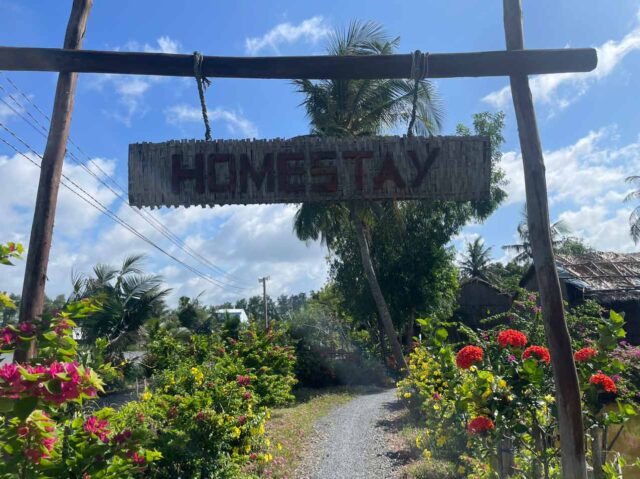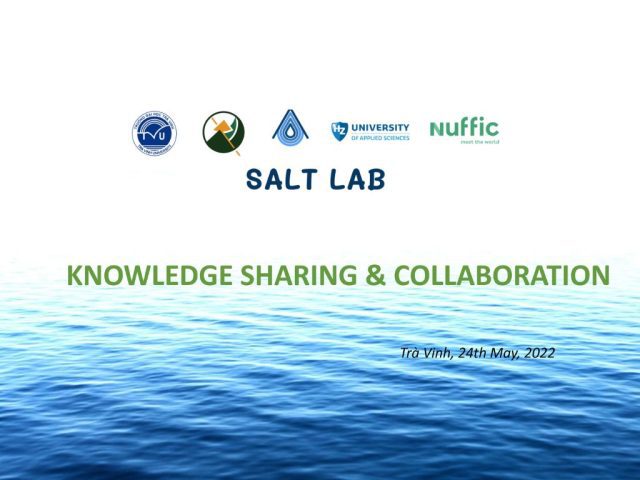Let’s explore the interesting stories of farmers in Tra Vinh Province who are at the forefront of innovative agricultural practices, by adapting to salt water intrusion, water scarcity, and market fluctuations. Discover their strategies for resilience and the commitment to sustainable agriculture.
Cantaloupe Farmer In The Net House
Mr. Thien is a prominent figure in Duyen Hai town, known for his contributions to crop diversification and his ability to adapt to climate change challenges. His innovative farming practices, including the use of coconut mulch substrates, organic fertilizers, and advanced technologies like ventilation fans and drip irrigation, have set a benchmark in the region. He also cultivates purple onions, which are of higher economic value compared to local varieties and have salt tolerance properties. The cooperative he leads is expanding its land allocation for high-value crop cultivation and actively procures agricultural products from the local area.
However, Mr. Thien faces challenges during the dry season when deep wells run dry and surface wells become tainted with lime and alum contamination. Pollution from shrimp ponds affects the water quality, making it difficult to use water-efficient irrigation technologies. To address these challenges, Mr. Thien has adapted by rotating crops based on seasons. His future plans involve optimizing net house space, enhancing the cooperative model for local agricultural products, and implementing rainwater collection for irrigation during the dry season.
Shrimp Pond Into Netted Greenhouse Vegetables
Duc, an experienced farmer, began his agricultural journey at 18, moving to Tra Vinh with his wife to raise cattle, cultivate shrimp, and grow vegetables. In 2022, he converted a shrimp pond into a vegetable greenhouse with government support. Currently, they cultivate Gotu kola (Hydrocotyle) in a subsidized 1,000 sqm greenhouse and exclusively farm crabs in five ponds due to declining shrimp prices. Duc primarily uses the Hau River for aquaculture water, with minimal water quality regulation. For domestic and vegetable use, they rely on drilled wells, which are experiencing water scarcity.
Despite success in cattle breeding, current beef prices have dropped, causing losses. Other challenges include damage to the vegetable net house due to flooding, lack of technical knowledge, and information gaps on vegetable prices. Duc is addressing these challenges by growing Gotu kola, exclusively farming crabs, and downsizing the cattle herd. Duc plans to expand vegetable production, identify suitable vegetables, and collaborate on enhancing existing facilities and methodologies for more efficient market entry.
Rotating Crops Based On Seasons
Mr. Tran Van Ut is a farmer and chairman of the Hanh My agricultural cooperative in Tra Vinh province, Vietnam, with over a decade of experience in rice and cash crop cultivation. He manages 7,000 square meters of land and faces challenges related to water scarcity and salinity, especially during the dry season. Water sources in his region are affected by salinity contamination from August to July, impacting crop irrigation. Hence canal regulation and well drilling are essential for managing water sources. Additional challenges include price pressure from traders, rising fertilizer costs, pest issues, and lack of access to training on water management.
To address these challenges, he has been adjusting crop choices based on the salinity cycle and shifting to cattle and shrimp during the dry season. In the long run, Mr. Ut is planning to include transitioning to year-round vegetable cultivation, exploring organic fertilizer production, and experimenting with fruit tree planting.





